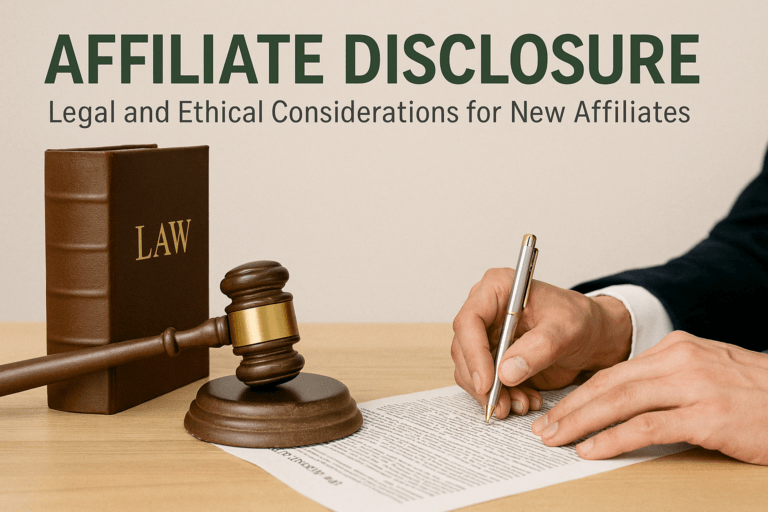Affiliate Marketing Compliance: Staying on Top of Legal and Ethical Standards
In the fast-changing world of digital marketing, one key area often missed is affiliate marketing compliance. More businesses are using affiliate partnerships to boost traffic and sales. It’s vital to grasp the complex legal and ethical rules that guide this profitable tactic1. But have you ever thought, “What are the main things to keep in mind to make sure your affiliate marketing is both legal and trustworthy?”
Following a set of rules is what affiliate marketing compliance is all about1. It means sticking to laws on advertising, consumer protection, and data privacy. It also means being open and honest in all marketing1. It’s not just about avoiding trouble with the law; it’s about earning trust from your affiliates and customers. It’s about running a business that’s both sustainable and ethical.
…For a comprehensive understanding of expert strategies, including compliance, see Affiliate Marketing Expert Level: Advanced Strategies to Generate €50,000/Month and More.
Key Takeaways
- Affiliate marketing compliance is key to keeping trust and avoiding legal problems.
- It involves following rules and guidelines, focusing on best practices and legal needs.
- Affiliates must stick to laws on advertising, consumer protection, and data privacy.
- Being clear about financial ties is crucial for compliance.
- Compliance stops dishonest practices that can harm your reputation and lead to legal trouble.
Understanding the Fundamentals of Affiliate Marketing Compliance
Getting into affiliate marketing compliance is key for businesses and marketers. It’s about working together in a fair and successful way. At the heart of it is performance-based marketing. This means affiliates get paid for things like sales, leads, or clicks2.
Defining Performance-Based Marketing
Performance-based marketing is a great way for businesses to use affiliate partnerships. It pays affiliates based on their results. This makes them work hard to promote products in a real and effective way2.
Core Components of Compliance
Keeping up with affiliate marketing compliance involves a few main things. These are being open, honest, and careful with data. Affiliates must follow rules from groups like the Federal Trade Commission (FTC). They need to clearly show when something is sponsored and follow laws to protect consumers2.
Also, they must follow data privacy laws, like the GDPR, when working with people in Europe2.
Role of Regulatory Bodies
Groups like the FTC in the U.S. and others worldwide are very important. They make and enforce rules for fair affiliate marketing. They help keep advertisers and affiliates honest, so consumers are safe from tricks3.
Knowing and following these rules is vital. It helps build trust in the affiliate marketing world3.
By understanding and following affiliate marketing compliance, everyone can do well. This leads to strong and lasting partnerships that help both the brand and the customer2.
FTC Guidelines and Disclosure Requirements
In the world of affiliate marketing, being open is key. The Federal Trade Commission (FTC) has set clear rules to help people know when they might be influenced by what they see4. These rules say that anyone in affiliate marketing must clearly show they have a relationship with the products they talk about4.
The FTC wants these disclosures to be easy to see and understand, right before any links4. Just adding “(Affiliate)” or “#Affiliate” isn’t enough, and putting them in site navigation isn’t good enough either4. The disclosure must stand out, whether it’s in an Instagram post or a YouTube video4.
If you don’t follow the FTC’s rules, you could be breaking the law4. It’s important for affiliate marketers to keep up with these rules and check their disclosures often5.
| FTC Affiliate Disclosure Requirements | Compliance Highlights |
|---|---|
| Disclosures must be clear and conspicuous | Placed before affiliate links, not hidden in site navigation |
| Notations like “(Affiliate)” or “#Affiliate” are not sufficient | Disclosures must be prominently displayed and easily noticed |
| Instagram posts must feature the disclosure above the ‘Read more’ button | YouTube videos must have visual and audible disclosures |
| Failing to comply violates the FTC Act’s anti-deception provisions | Can result in enforcement action against advertisers or endorsers |
As rules change, affiliate marketers need to stay updated and check their disclosures often5. The FTC Endorsement Guides offer important insights into the Commission’s views on endorsements and their legal implications5.
“The core legal basis for the Guides lies in Section 5 of the FTC Act, which prohibits deceptive advertising practices.”5
By being open and following the FTC’s guidelines, affiliate marketers can earn trust from their audience. They show they are committed to fair and legal practices5.
Global Privacy Laws Impact on Affiliate Marketing
Global privacy laws have changed the affiliate marketing world a lot. Laws like the GDPR and CCPA have made rules for how data is collected, used, and kept safe67.
GDPR Compliance Requirements
The GDPR started in May 2018. It gives people more say over their personal data6. In the European Union, affiliates need clear consent to use user info. They must also be open about why they collect data67.
Breaking GDPR rules can lead to big fines. These fines can be up to 4% of a company’s yearly earnings or 20 million euros, whichever is more7.
CCPA and State-Level Regulations
In the U.S., the CCPA started in January 2020. It gives California residents more control over their data6. Like GDPR, it requires clear consent and transparency in data use6.
More states are making their own privacy laws. Affiliates need to keep up with these changes in different places.
International Privacy Standards
Other countries like Brazil and Canada also have privacy laws. These laws affect how affiliates handle data6. Affiliates must follow these rules, using good security and getting consent from users in different places6.
Privacy laws worldwide are making affiliate marketers focus more on ethics and trust6. To follow these rules, affiliates need to get clear consent, use less data, and keep it safe6. Not following these laws can lead to big fines and harm a program’s reputation67.
“Privacy regulations like GDPR and CCPA are reshaping the affiliate marketing landscape, driving affiliates to prioritize user consent, transparency, and data protection.”
Common Affiliate Marketing Violations and Risks
In the world of affiliate marketing, many violations and risks can harm campaigns and trust8. Forrester found that 38% of marketers deal with fraud in their programs8. These problems can lead to big risks and hurt the ethics of marketing.
One big issue is when affiliates break paid search policies by bidding on trademarks without permission9. They might also use tricks like cookie stuffing or malware without asking, which is very wrong9.
These wrongdoings can cause big problems, like money losses and legal trouble9. False ads can also hurt the trust in marketing9.
There are also risks from misuse of brand assets, like changing logos without permission9. This can lead to legal fights and hurt the trust between brands and affiliates9.
To avoid these problems, companies need clear rules and to watch what affiliates do10. They should also act fast if someone breaks the rules10. This way, brands can work well with their affiliates and build strong relationships10.
| Violation | Description | Potential Consequences |
|---|---|---|
| Trademark Bidding | Affiliates bidding on brand trademarks in paid search without prior approval | Inflated costs, consumer confusion |
| Cookie Stuffing | Placing tracking cookies on visitor devices without consent to earn commissions | Loss of trust, financial penalties |
| False Advertising | Misrepresenting product/service benefits that do not align with reality | Reputational damage, legal action |
| Adware/Malware | Deploying software programs without user knowledge or consent | Compliance violations, legal issues |
| Misuse of Assets | Unauthorized alteration of brand logos, images, or other proprietary materials | Intellectual property disputes, brand reputation issues |
Knowing about these common problems helps affiliates and marketers make better plans8910. This way, they can make affiliate marketing more honest and open8910.
Paid Search Policy Violations and Prevention
Affiliate marketing is complex and needs strict policy following. A big problem is trademark bidding fraud. This happens when affiliates use brand names without permission, even though it’s against the rules11.
These fraudsters use smart tricks to hide their actions. They might use special IP targeting and schedule their ads to avoid detection. They also create fake URLs and websites to look real11.
Monitoring and Detection Strategies
Stopping policy violations starts with good monitoring. Affiliates with high conversion rates or sudden order spikes might be up to no good11. Companies check visitors to see if they’re real customers or part of the fraud11.
Bad affiliates use tricks like the CSS History Hack to see if they’re being watched11. They also use fake websites that look like blogs or review sites to hide their tracks11.
Policy Enforcement Methods
Companies need strong ways to enforce their policies. This includes clear rules, regular checks on search results, and tools to spot suspicious activity11. If caught, affiliates might get a warning or kicked out of the program11.
Keeping affiliate marketing honest is vital. Issues like cookie stuffing and fake clicks can hurt commissions and user trust12. Sticking to ethical standards helps protect a company’s reputation and keeps affiliate marketing working well12.
Content Authenticity and Ethical Marketing Practices
Successful affiliate marketing starts with creating real, trustworthy content. As we move through the fast-changing world of affiliate marketing, keeping things transparent and ethical is key. This builds strong bonds with our audience13. The Federal Trade Commission (FTC) says it’s vital to clearly share our partnerships and what our content is about13.
Making genuine content is not just good practice; it’s a must for ethical affiliate marketing13. Sharing real opinions and experiences that our audience can relate to builds trust. This leads to marketing that works well over time13. We need to find a balance between being excited and being fair, showing both the good and bad sides of what we promote13.
Being ethical is very important in our field. Bad practices can hurt consumer trust and harm a brand’s image14. It’s important to be open, share our connections, and avoid biased reviews. This keeps our content honest and our audience’s trust strong14.
- Do your homework before using any brand stuff or copyrighted material to avoid legal trouble13.
- Use approved affiliate marketing stuff from programs to follow the law and make our content better13.
- Keep checking your content to stay real and keep your audience’s trust13.
By focusing on real content and ethical marketing, we can succeed in the affiliate marketing world14. Following these rules is not just about following the law; it’s a smart move that can make our campaigns succeed14.
| Key Considerations | Importance |
|---|---|
| Transparency and Disclosure | Crucial for building trust and following FTC rules13. |
| Authentic Content Creation | Builds trust, leads to lasting marketing success13. |
| Ethical Marketing Practices | Protects brand image, ensures lasting success in the industry14. |
| Compliance with Privacy Laws | Keeps user trust, shows we’re ethical13. |
| Intellectual Property Management | Avoids legal problems, keeps brand safe13. |
By sticking to these values, we can make content that truly connects with our audience. This positions our affiliate marketing for lasting success14.
“Ethical considerations in affiliate marketing are crucial for creating trust and compliance. Upholding ethical standards is essential for the sustainability and long-term success of the industry.”14

In the ever-changing world of affiliate marketing, staying true, open, and ethical is key. This is the base for building trust and growing sustainably15. By putting these values first, we make sure our marketing meets our audience’s needs. This leads to better success and a brighter future15.
Data Protection and User Privacy Safeguards
In the world of affiliate marketing, keeping data safe and respecting privacy is key. Marketers use data to run their campaigns, so they must protect it well. This means keeping personal info safe and respecting each person’s privacy16.
Data Collection Best Practices
Affiliate marketers should only collect personal data when it’s really needed. They must get clear consent from users first. It’s also important to tell users how their data will be used and stored17.
Security Measures Implementation
Keeping user data safe is a big job for affiliate marketers. They need to use strong encryption, keep data on secure servers, and check their data protection often17.
User Consent Management
Letting users control their data is important in affiliate marketing. Giving users easy ways to change their settings or delete their data shows respect for their privacy. Having good systems for getting consent helps follow the rules1617.
By focusing on data protection and privacy, affiliate marketers can earn trust and follow the rules. Following best practices in collecting, securing, and managing consent is key in the fast-changing world of affiliate marketing17.
| Best Practices | Key Considerations |
|---|---|
| Minimize data collection | Collect only essential information |
| Obtain explicit user consent | Provide clear communication on data usage |
| Implement secure data storage | Use encryption and secure servers |
| Empower user control | Offer options to update preferences or request data deletion |
“Affiliate marketing compliance is not just a box to check, but a framework for building trust and ensuring long-term success.” – Industry Expert
Preventing Fraud and Deceptive Practices
In the world of affiliate marketing, keeping things honest is key. Affiliate fraud prevention and stopping deceptive marketing practices need a strong plan. This plan uses fraud detection tools and careful watching.
The affiliate marketing field is expected to grow from $13 billion in 2022 to $15.7 billion by 2024. This growth comes with the challenge of fraud, which could cost businesses about $100 billion by 202318.
Fraud in affiliate marketing can happen in many ways. This includes click spoofing, cookie stuffing, and more. These actions can harm a brand’s reputation and cost a lot of money19.
To fight fraud, businesses need to use strong fraud detection tools and watch closely. Signs of fraud include odd traffic patterns and suspicious devices. Advanced analytics and device fingerprinting help catch these issues quickly19.
It’s also important to have clear rules against false ads and educate affiliates. Teaching them about right and wrong is key. A strict check on new affiliates can also help stop fraud19.
By being alert, using the latest fraud detection tools, and promoting honesty, companies can thrive. They can protect their reputation and grow in a healthy way1918.

Affiliate Program Terms and Conditions
Creating detailed affiliate program terms is key for staying legal and setting clear rules for your partners. These agreements should cover what’s okay to do, how you’ll pay them, and what rules they must follow. This makes sure your program follows the law and industry standards20.
By setting out the rules clearly, you can manage your partnerships well and avoid problems.
Contract Development Guidelines
When making your affiliate contract, include many different clauses to handle different situations21. This flexibility lets you make the agreement fit your business and program needs. Also, make sure your contract is in many languages to reach more people worldwide21.
Legal Compliance Requirements
Following rules from bodies like the Federal Trade Commission (FTC) is very important22. Not following these rules can lead to big fines and harm your brand’s image22. Make sure your contract bans spam, bad marketing, and copying others’ work to keep your business safe22.
Using tools like WPLegalPages can help you make good privacy policies and terms of service. This keeps your program in line with the law22.
Enforcement Mechanisms
Make sure your affiliate program terms have clear ways to enforce them. This means saying what happens if someone breaks the rules, like getting a warning or being kicked out20. Also, update your terms often to keep up with new laws, rules, or changes in your business.
By making detailed affiliate program terms, you create a safe and honest marketing space. This builds trust with your affiliates and keeps your business safe from legal and image problems202122.
Building Trust Through Transparent Marketing
In the world of affiliate marketing, success comes from building trust with your audience. This trust is built through honest and transparent practices23. Brands need to match their values with those of their affiliate partners to reach their audience effectively23.
Being open is key in affiliate marketing23. Brands must clearly show their affiliate ties in all promotional content. This makes sure the audience knows about these partnerships24. It also meets legal rules and makes the affiliates seem more trustworthy24.
Real and honest reviews help build trust with your audience24. Good affiliate marketers listen to their audience and change their content based on feedback. This keeps them relevant and engaging24. By being open and real, brands can connect deeply with their customers, leading to long-term success23.
It’s also important to keep your message the same everywhere23. Businesses should make sure their marketing is consistent. This gives the audience a clear and strong brand experience23. Being consistent helps show the brand’s trustworthiness and commitment to doing the right thing23.
Brands should also show they follow industry rules and laws23. Bad practices like click spam hurt a brand’s reputation23. By following the rules and promoting ethically, businesses can be seen as trustworthy. This leads to success in affiliate marketing23.
| Transparent Affiliate Marketing Strategies | Benefits |
|---|---|
| Clear Disclosure of Affiliate Relationships | Builds Trust and Credibility |
| Honest Product Reviews and Recommendations | Enhances Authenticity and Engagement |
| Consistent Messaging Across Channels | Reinforces Brand’s Commitment to Ethics |
| Adherence to Industry Standards and Regulations | Establishes Trustworthiness and Mitigates Risks |
By using honest and ethical affiliate marketing, businesses can build a strong trust with their audience. This leads to long-term success in a changing industry23. In tough economic times, being open and trustworthy can give you an edge23.

“Transparency and trust are the cornerstones of successful affiliate marketing. Brands that prioritize these values will thrive in the long run.”
Conclusion
Maintaining compliance in affiliate marketing is key for businesses of all sizes. The industry is growing fast, with a 19% annual growth rate until 2032. It’s expected to reach a $40 billion value25.
Affiliate marketing programs involve third parties promoting our products for a commission. But, they come with risks if not managed right25. Following FTC guidelines and disclosure rules is vital to protect our brand and customers26.
Unethical tactics by affiliates can lead to legal trouble25. By following affiliate compliance best practices, ethical marketing standards, and our legal obligations in affiliate marketing, we can succeed. This builds trust and loyalty with our audience26.
Staying updated on regulations and being committed to compliance is crucial. It helps us grow our business with integrity and protect our customers.
Source Links
- https://usercentrics.com/guides/privacy-led-marketing/affiliate-marketing-compliance/ – Affiliate Marketing Compliance – What You Need To Know
- https://medium.com/@AffiliateXplorer/introduction-to-affiliate-marketing-a0f90e41f61b – Affiliate Marketing Basics: Understand the Fundamentals of Affiliate Marketing
- https://www.digidarts.com/blog/navigating-legalities-compliance-guidelines-for-affiliate-marketing/ – Compliance Guidelines for Affiliate Marketing | Digidarts
- https://termly.io/resources/articles/ftc-affiliate-disclosure/ – FTC Affiliate Disclosure
- https://www.ftc.gov/business-guidance/resources/ftcs-endorsement-guides-what-people-are-asking – FTC’s Endorsement Guides: What People Are Asking
- https://medium.com/@info_92521/affiliate-marketing-and-privacy-regulations-navigating-the-gdpr-and-ccpa-a1b7258d49fb – Affiliate Marketing and Privacy Regulations: Navigating the GDPR and CCPA
- https://easyaffiliate.com/blog/how-the-gdpr-affects-your-affiliate-program/ – How the GDPR Affects Your Affiliate Program
- https://www.linkedin.com/advice/0/what-risks-affiliate-marketing-how-can-you-mitigate – What are the risks of affiliate marketing and how can you mitigate them?
- https://www.growann.com/post/affiliate-program-violations – Affiliate Program Policy & Rules Violations: How to Avoid
- https://theceolegalloft.com/legal-pitfalls-affiliate-marketing/ – Legal Pitfalls of Affiliate Marketing
- https://www.brandverity.com/blog/affiliate-compliance-guide – Affiliate Compliance Guide: Strategies To Combat Affiliate Fraud
- https://www.unsubcentral.com/affiliate-marketing-compliance/ – Ensure Affiliate Marketing Compliance with UnsubCentral
- https://www.linkedin.com/pulse/legal-ethical-considerations-affiliate-marketing-david-oscar-rx56f – Legal and Ethical Considerations in Affiliate Marketing
- https://www.linkedin.com/pulse/ethical-considerations-affiliate-marketing-michael-weare-wsbfe – Ethical Considerations in Affiliate Marketing
- https://ranking-articles.com/considerations-in-affiliate-marketing-content/ – Ethical Considerations In Affiliate Marketing Content » Ranking Articles
- https://usercentrics.com/knowledge-hub/data-protection-and-affiliate-marketing/ – Data protection and Affiliate Marketing – an impossible match?
- https://www.linkedin.com/pulse/navigating-legalities-affiliate-marketing-our-michael-weare-tiz2e – Navigating the Legalities of Affiliate Marketing: Our Observations
- https://www.forbes.com/councils/forbestechcouncil/2023/01/26/affiliate-marketing-compliance-4-things-you-need-to-know/ – Council Post: Affiliate Marketing Compliance: 4 Things You Need To Know
- https://www.advertisepurple.com/affiliate-fraud-prevention-expert-advice-and-best-practices/ – Affiliate Fraud Prevention – Expert Advice and Best Practices – Advertise Purple
- https://legal.hubspot.com/affiliate-program-agreement – Affiliate Program Agreement
- https://www.iubenda.com/en/help/22659-affiliate-terms-and-conditions-generator – How to Set Terms and Conditions for Your Affiliate Marketing Program
- https://easyaffiliate.com/blog/set-out-terms-and-conditions/ – How to Set Terms and Conditions for Your Affiliate Marketing Program
- https://www.forbes.com/councils/forbestechcouncil/2023/08/23/how-to-build-trust-and-credibility-in-affiliate-marketing/ – Council Post: How To Build Trust And Credibility In Affiliate Marketing
- https://www.winsavvy.com/the-importance-of-trust-and-transparency-in-affiliate-marketing/ – The Importance of Trust and Transparency in Affiliate Marketing
- https://www.shopify.com/blog/affiliate-marketing-compliance – How Brands Maintain Affiliate Marketing Compliance (2024) – Shopify
- https://prettylinks.com/blog/affiliate-link-disclosures-best-practices/ – Affiliate Link Disclosures: How to Stay Compliant and Build Trust







